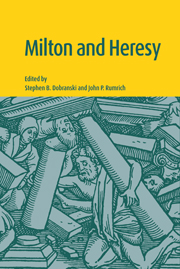Introduction: Heretical Milton
Published online by Cambridge University Press: 10 October 2009
Summary
There are some irrational bigots who, by a perversion of justice, condemn anything they consider inconsistent with conventional beliefs and give it an invidious title – “heretic” or “heresy” – without consulting the evidence of the Bible upon the point. To their way of thinking, by branding anyone out of hand with this hateful name, they silence him with one word and need take no further trouble.
John Milton, de doctrina Christiana (CP VI: 123)Our understanding of Milton and heresy must begin with his theological treatise, de doctrina Christiana. In what he described as his “dearest and best possession,” Milton rejects the Trinity, denies creation ex nihilo, and insists on the common materiality and mortality of body and soul (CP VI: 590). It seems absurd that the idiosyncratic Christian revealed by de doctrina – who also opposed infant baptism, scorned paid clergy, renounced state interference in religious affairs, defended divorce, and approved of polygamy – could be heard as a voice of orthodoxy. Yet twentieth-century scholars have often understated, explained away, or otherwise soft-pedaled his heretical beliefs. When efforts to mitigate Milton's heresies have met with resistance, some have tried to eradicate them at their most germane textual source: witness the recent challenge to Milton's authorship of de doctrina Christiana.
This collection investigates aspects of Milton's works “inconsistent with conventional beliefs” – whether those conventional beliefs comprise standard dogmas of seventeenth-century theologians, or common assumptions of recent Milton scholars. Although we are stretching the meaning of “heresy” by including chapters that dissent from modern critical orthodoxies, we are encouraged by Milton's own flexibility of usage.
- Type
- Chapter
- Information
- Milton and Heresy , pp. 1 - 18Publisher: Cambridge University PressPrint publication year: 1998
- 1
- Cited by

